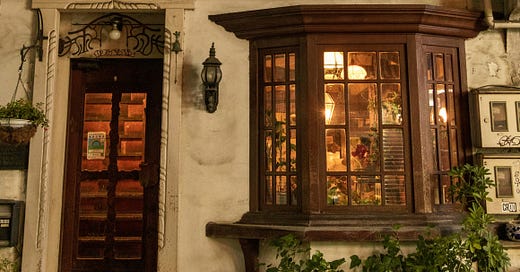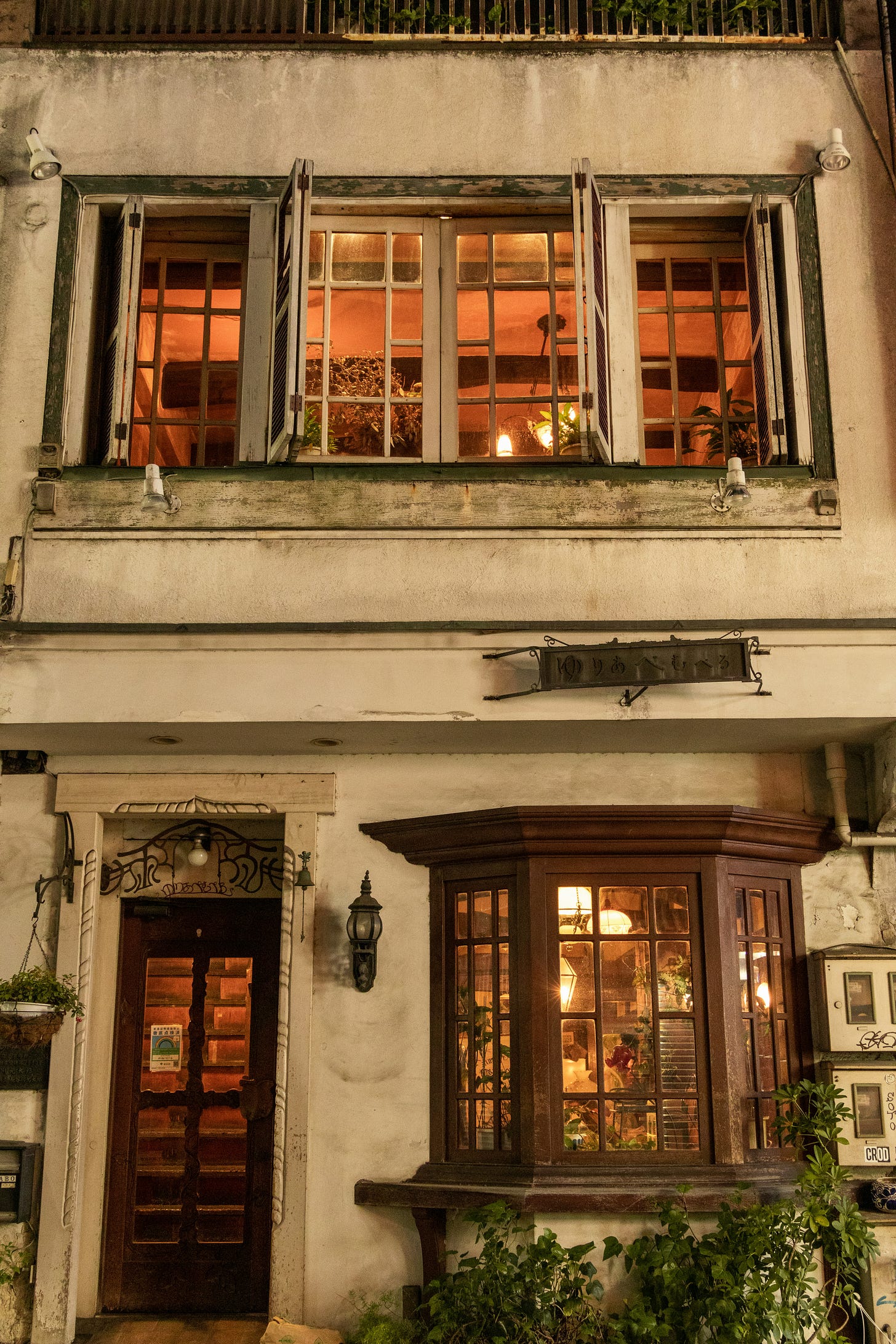Since moving to Japan, I’m on a quest to find the perfect kissaten.
What are kissaten1? If you think of café types in Japan, kissaten are as far away from chains like Starbucks and Doutor as you can get.
Initially surging in popularity during Japan’s post-war era, kissaten were meant to cater to people like writers and businessmen who needed a quiet space to read, think and converse in low tones over a coffee and a light meal. Think of them as a type of cozy shelter from the incessant goings-on of the city, a place divorced from time.2
Many kissa are furnished and decorated in the Shōwa retro style: dark wood, leather booths or mismatched chairs, floral patterns, crammed to the brim with books, magazines, and knickknacks, all illuminated by the dusty haze of one too many cigarettes and days gone by.
To find the perfect kissa, I had to wait in the freezing cold for thirty minutes. I had no idea when a seat would open up, was debating leaving and coming back another time. Something about the worn wooden door and the tiny cat figurines wedged into every crack of the grey brick shopfront kept me there.
Finally the door opens and I’m greeted by a European-chic young lady who welcomes me in a wispy high-pitched voice, the most anime girl voice I’ve ever heard outside a screen. After exchanging my shoes for indoor slippers, I climb a steep staircase, so narrow I’m scared of falling back down or bumping my head. Until I’m seated, the kissa feels like a space at least two sizes too small.
In addition to the three tables downstairs, the second floor has another four tables of varying sizes in what I envision to be the young woman’s living room: low bookshelves, colourful stained glass lamps, glass tabletops, every available surface crammed with plants, cat figurines, and stranded Christmas decorations. There’s still a tree in the corner. It makes you believe time has come to a halt, preserving a rich rainbow-coloured slice of the Shōwa era. The quiet is fragrant with soft choral music playing in the background.
The menu comes with “requests to customers” in Japanese on the first page and awkward but endearing English on the second.
First-time customers are asked to speak in a quiet voice that cats will like. “It’s a small and quiet shop, so it would be helpful if you didn’t advertise it (because cats are sensitive to crowds. I’m sorry…)”
Please don’t stay longer than two hours or if you do, order another drink.
Customers with cat allergies or who don’t like cats are asked to refrain from visiting. “This is my home and shop, so sometimes cats are relaxing in the shop.”
It’s not a cat café so customers are asked to not touch or disturb the cats. “It seems that the cat will feel relieved if you can gently watch over it with a moderate sense of distance.”
It’s the first time I’ve seen a café that doesn’t want to be advertised, citing that cats hate crowds. I’m charmed. After a while, I notice a fluffy grey-white fur ball sleeping in a cushioned basket on another table. The young man sitting at the table is typing away on his Macbook, only occasionally gazing at the cat. Is he checking she’s still comfortable or stocking up on cute and soothing vibes?
As an Austrian, I had to order “Vienna coffee”, which turns out to be Einspänner—two shots of espresso, topped with whipped cream and served in a high glass. It comes with a glass of iced water and one Biscoff cookie on the side. It’s delicious.
The longer I sit, the more obvious it becomes that it’s the cats ruling this café. The chic young lady only acts as custodian for them. True, they were doing little more than sleep and munch on dry cat food on a high corner platform but their imperious gazes leave no doubt that they would leap to action the second someone misbehaves.
Two men creak up the stairs and occupy the largest table with their big black jackets, their male-perfumed bodies, and one DSLR camera squatting on the glass tabletop like a panther. One speaks American-accented English, the other Japanese, both are dominating in their noise. They chat about the alcoholic drinks on the menu, photos they took, and lunch plans for the next day, Monday.
They ask the chic young lady to take a picture for them. Ever the gracious hostess, she complies but only looks to the Japanese-speaking man for instruction and confirmation. In Japan, foreigners that boisterous are either shunned or brushed off with “Sorry, my English is not good”.
The men leave quickly. Perhaps they were hoping for a different place. Perhaps they were uncomfortable in the quiet. Perhaps they didn’t care for the cats—I can’t claim to understand but there are in fact people who don’t care for cats.
The cats certainly didn’t care for them. Their magic is only for those already susceptible to falling through time and space.
Peace returns. When I climb downstairs, the chic young lady apologises to me for the long wait. I thank her for the delicious coffee and the wonderful atmosphere. The tiny cat figurines watch as we exchange bows of goodbye and gratitude. As I cross the street and make my way to the nearest subway station, memories of the café warm me against the winter night. Despite the distance—over one hour on the train from where I live—and the limited seating, I vow to return soon.
What is it about this café? Like many others, it resembles a second living room but better: I’m not fond of cramming my own apartment with clutter, however cosy. I don’t make delicious beverages reminiscent of Vienna coffee house culture. I haven’t been ruled by a cat in many years and yes, I miss it. Perhaps the appeal lies in the idealised living space, untouched by the monastic Scandi-Ikea-Instagram aesthetic that we can’t seem to escape and watched over by beings shaped like cats that might as well be bakeneko3.
Whatever it is, I only know that I’ve found my perfect kissa. And I can’t tell you its name or location because I was asked to protect its timeless Shōwa retro magic. Trust that if you’re meant to find it, you will.
喫茶店 literally means tea-drinking shop, although most kissaten also offer coffee nowadays.
How to find the perfect kissaten by Tokyo Weekender.




Great piece, Vanessa. I host a writing group during the week and we meet about 40 minutes from my home. People ask why i waste time driving to a market when I could just write. Sometimes, more productive and effective work occurs when I am away from the distractions of home and sitting with others, listening to the click of their fingers on keyboards and background gibber jabber of other patrons.
I once spent two weeks wandering the streets of Boston looking for the perfect writing cafe. I never found it. In existential defiance, I wrote a bad story about the experience. Maybe if I’d found a place like yours, I would have written a good one.